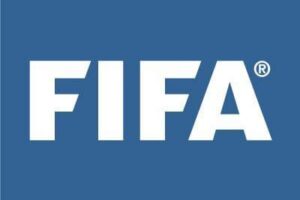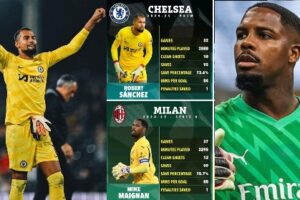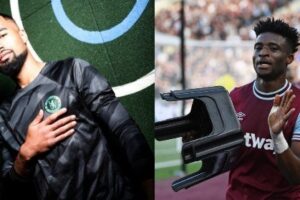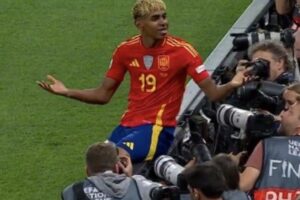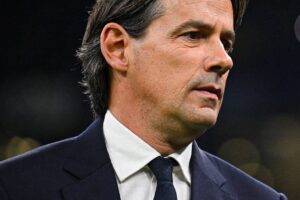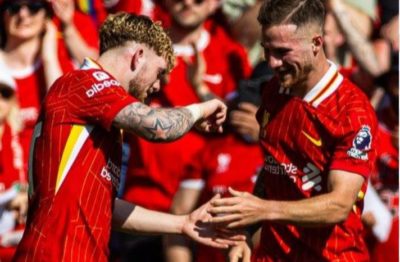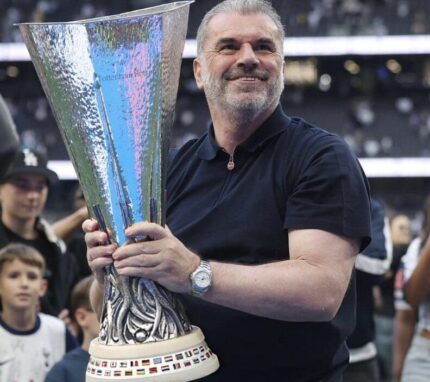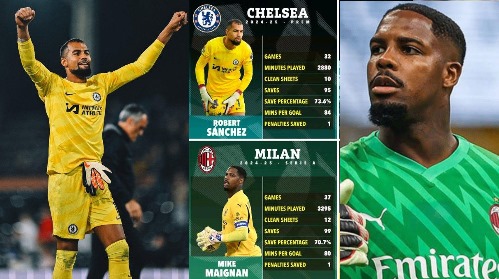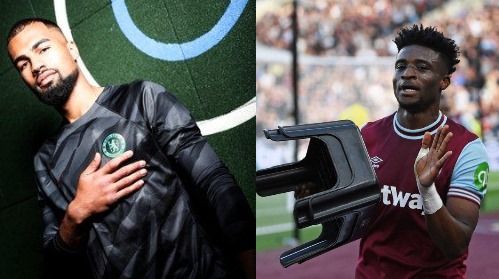In the highly anticipated opening match of the 2024/25 Premier League season, Liverpool faced off against newly promoted Ipswich Town. Despite the Reds’ attempts to break through, the first half ended in a goalless stalemate, with Liverpool struggling to find their rhythm against a determined Ipswich side.
From the outset, Ipswich made their intentions clear, with Omari Hutchinson forcing Liverpool’s defense into action just two minutes into the game. The early exchanges were marred by fouls, as Ipswich’s aggressive approach resulted in multiple free kicks for Liverpool. Trent Alexander-Arnold and Dominik Szoboszlai were on the receiving end of challenges, but the Reds failed to capitalize on these set pieces.
Liverpool’s frustrations grew as the half wore on. A series of blocked attempts and fouls disrupted the flow of the game, with Ipswich’s Luke Woolfenden and Omari Hutchinson receiving yellow cards for their heavy challenges. Despite their best efforts, Liverpool struggled to convert their possession into clear-cut chances, with Dominik Szoboszlai and Luis Díaz both seeing their attempts blocked.
Ipswich’s Tactical Discipline Keeps Liverpool at Bay
Ipswich Town, despite being newly promoted, demonstrated impressive tactical discipline throughout the first half. The Tractor Boys, under the guidance of their manager, managed to neutralize Liverpool’s attacking threats with a combination of physicality and well-organized defensive play.
Ipswich’s defensive resilience was highlighted by their ability to absorb pressure and hit Liverpool on the counter. The visitors were particularly effective at disrupting Liverpool’s build-up play, with key players like Sam Morsy and Jacob Greaves winning crucial free kicks in dangerous areas. Ipswich also showed their aerial threat, with Jacob Greaves forcing a save from Liverpool’s goalkeeper in the 20th minute, and Axel Tuanzebe narrowly missing the target with a header later in the half.
Despite conceding several corners, Ipswich’s defense remained resolute, blocking shots from Szoboszlai and Trent Alexander-Arnold. The first half ended with Ipswich keeping Liverpool at bay, much to the frustration of the home fans at Anfield.
Liverpool’s Midfield Struggles to Gain Control
One of the key narratives of the first half was Liverpool’s inability to assert control in midfield. The Reds, known for their high-intensity pressing and quick transitions, were stifled by Ipswich’s compact and aggressive midfield play. Ryan Gravenberch, Dominik Szoboszlai, and Alexis Mac Allister were all involved in physical battles, but struggled to create meaningful chances for their forwards.
Ipswich’s midfield, led by Massimo Luongo and Sam Morsy, excelled at breaking up play and winning fouls in crucial areas. This disrupted Liverpool rhythm and prevented them from building momentum. The frequent stoppages in play, coupled with Ipswich’s tactical fouling, frustrated Liverpool and prevented them from finding any real attacking fluency.
Moreover, Ipswich’s physical approach left Liverpool’s midfielders hesitant at times, and the Reds were unable to link up effectively with their forward line. As a result, Liverpool’s attacks were often disjointed, with Ipswich successfully cutting off the supply lines to Mohamed Salah and Diogo Jota.
Liverpool’s Set-Piece Opportunities Go Unrewarded
Despite winning multiple corners and free kicks in the first half, Liverpool were unable to convert these opportunities into goals. Ipswich’s defense, marshaled by Axel Tuanzebe and Jacob Greaves, dealt with Liverpool’s set-piece deliveries effectively, often clearing the ball or blocking shots before they could threaten the goal.
Liverpool’s best chance from a set piece came in the 45th minute when Trent Alexander-Arnold, known for his prowess from dead-ball situations, unleashed a powerful shot from outside the box. However, the attempt sailed over the crossbar, reflecting Liverpool’s frustrations in the first half.
Ipswich, on the other hand, posed a threat from their own set pieces, with Axel Tuanzebe coming close to scoring with a header following a free kick. The first half ended with Liverpool unable to capitalize on their numerous set-piece opportunities, leaving the match finely poised at 0-0 going into the break.
As the teams headed into the locker rooms, Liverpool manager Jürgen Klopp would have been left pondering how to break down Ipswich’s stubborn defense in the second half. Meanwhile, Ipswich Town could take confidence from their disciplined performance, knowing they had successfully frustrated one of the Premier League’s most formidable teams.
Liverpool’s Tactical Adjustments Pay Off in the Second Half
The second half of the match between Ipswich Town and Liverpool began with a tactical shift that would ultimately pay off for the visitors. Liverpool made a crucial substitution as Ibrahima Konaté replaced Jarell Quansah, signaling Jurgen Klopp’s intent to fortify the defense and add more experience to the backline. This change immediately brought a sense of stability to Liverpool, allowing them to gradually take control of the match.
From the very first minutes of the second half, Liverpool showed their intent to dominate, with Mohamed Salah and Luis Díaz combining for a series of attempts on goal. Although Ipswich Town managed to hold them off initially, the tide was clearly turning. The Reds’ persistence in the attacking third finally bore fruit as the half progressed, with the relentless pressure eventually leading to a breakthrough.
Salah and Jota Lead Liverpool’s Clinical Attack
Liverpool’s offensive power came to the fore with two clinical strikes that sealed the match in their favor. The first goal came in the 60th minute when Diogo Jota capitalized on a brilliant assist from Mohamed Salah. Jota, known for his sharp finishing, made no mistake as he slotted the ball into the top left corner from the center of the box, leaving the Ipswich goalkeeper with no chance. This goal was a testament to Liverpool’s high-pressing game and quick transitions, which caught Ipswich off guard.
Just five minutes later, Mohamed Salah doubled Liverpool’s lead with a well-placed shot to the bottom left corner. The Egyptian forward’s goal, assisted by Dominik Szoboszlai, showcased his lethal finishing ability and further underscored Liverpool’s dominance. Ipswich’s defense, which had been relatively solid in the first half, was now in disarray, struggling to cope with the relentless pressure from Liverpool’s front line.
Ipswich Town’s Struggles and Missed Opportunities
Ipswich Town, despite their best efforts, found themselves overwhelmed by Liverpool’s superior quality in the second half. The home side had moments where they could have pulled one back, but their attempts were either off-target or blocked by Liverpool’s resolute defense. Notably, Omari Hutchinson’s shot in the 68th minute sailed high and wide, epitomizing Ipswich’s struggles in front of goal.
The introduction of substitutes like Marcus Harness and Jack Taylor provided some fresh legs for Ipswich, but they were unable to change the course of the game. Ipswich’s offense was repeatedly thwarted by offside calls and Liverpool’s disciplined defense, which kept them at bay. The few chances Ipswich managed to create were met with strong resistance, ensuring that Alisson Becker’s goal remained unbreached.
Liverpool’s Defensive Solidity and Game Management
Liverpool’s game management in the closing stages was exemplary, as they effectively shut down any potential Ipswich comeback. Klopp’s substitutions, including bringing on Conor Bradley and Kostas Tsimikas, were geared towards maintaining defensive solidity and controlling the tempo of the game. Despite some late pressure from Ipswich, Liverpool’s defense held firm, with Konaté and Virgil van Dijk providing a formidable barrier in front of Alisson.
As the match drew to a close, Liverpool continued to manage the game effectively, limiting Ipswich’s opportunities and frustrating their attempts to get back into the match. Even when Ipswich managed to create shooting opportunities, Liverpool’s defenders were quick to block or clear the danger. The final whistle confirmed a well-deserved 2-0 victory for Liverpool, who showcased both their attacking prowess and defensive discipline in a commanding second-half performance.

